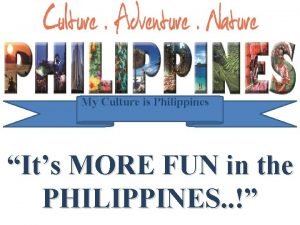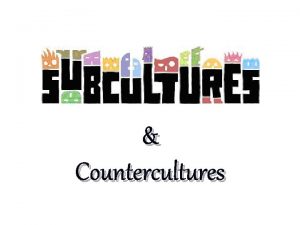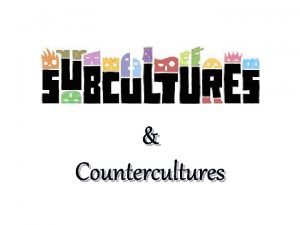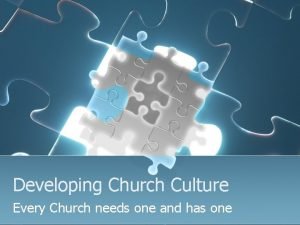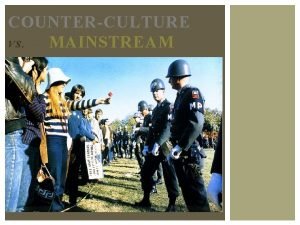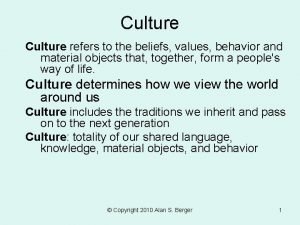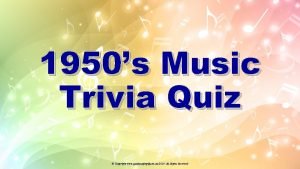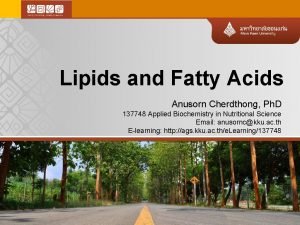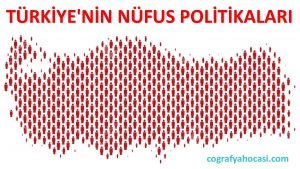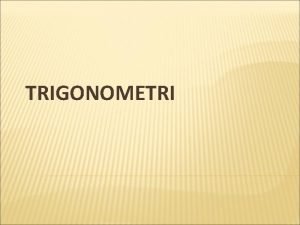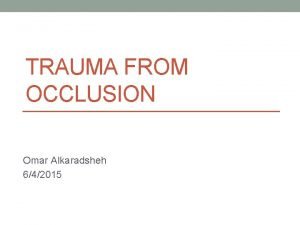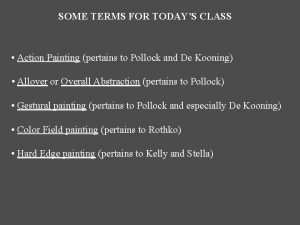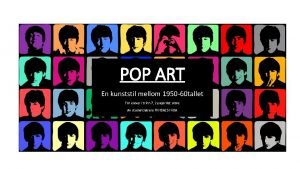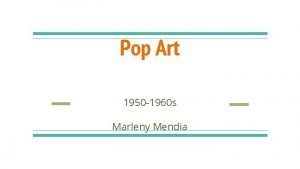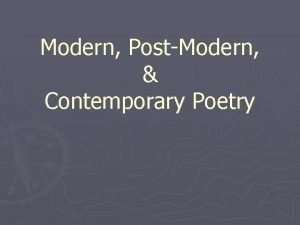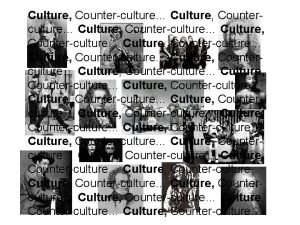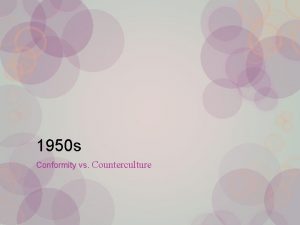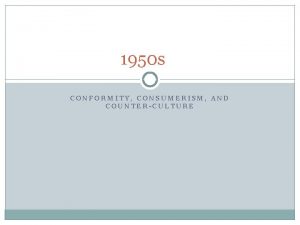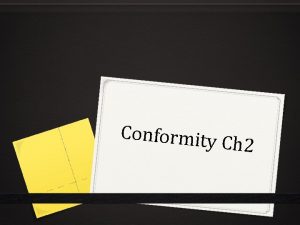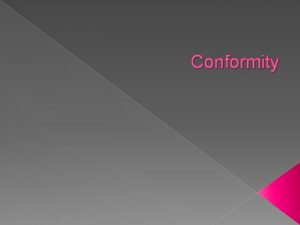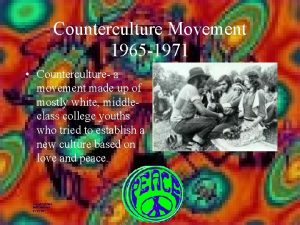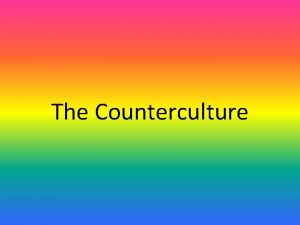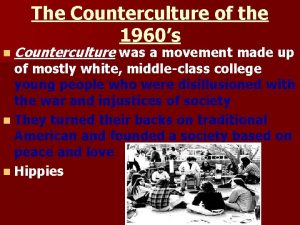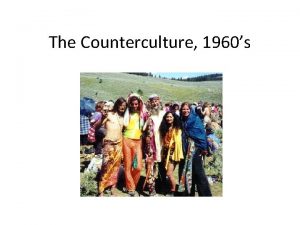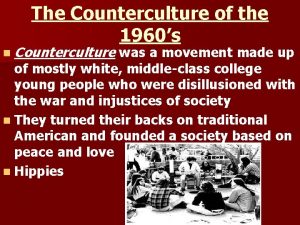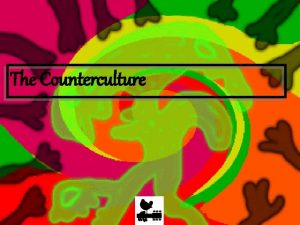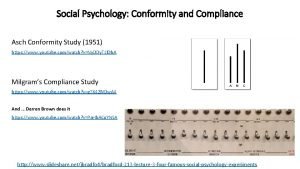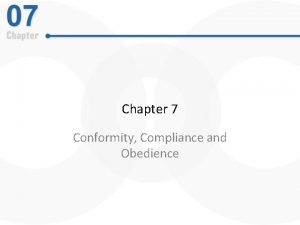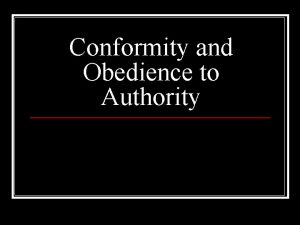1950 s Conformity vs Counterculture Essential Questions Was



















- Slides: 19

1950 s Conformity vs. Counterculture

Essential Questions Was conformity something people wanted, or did they feel obligated to conform? (choice vs. force) What role did gender, age and race play in the 1950 s? How did people use fear to force conformity? What is the ideal 1950 s family? What is the real 1950 s family?

Pleasantville – To get a better idea of the 1950 s, I suggest watching this film. The following are helpful questions to prepare you for the poetry to come that was written in reaction to the mainstream culture of the era. 1. What were the family values of the 1950’s? What were the roles of each of the family members? 2. What was valued most in society during the 1950’s? 3. What did the ideal 1950’s man look like? What did the ideal 1950’s woman look like? 4. What commentary is the movie making about conformity? 5. Why does the movie change from black and white to color? 6. David claims the people “are happy like this”. Do you think the people of the 1950’s were really happy? Explain with evidence from the film. 7. Why did people resist change in the 1950's? 8. What does the trial scene remind you of? Why? 9. What does the last scene mean?

Beat Movement Literature of the 1950 s

When? /Where? America post-World War II Primarily during the 1950 s San Francisco and New York were the hubs of the movement

What? Counterculture movement Non-conformity and spontaneous creativity Term ‘beat’ from writer Jack Kerouac Meaning tired or beaten down Also: upbeat, rhythm of poetry, jazz Characterized by drug use, sexuality, liberal perspectives, bohemian lifestyle Interested in changing consciousness and defying conventional writing The beatniks were the pre-hippies

Allen Ginsberg (1926 -1997) Leading figure of beatniks The Beat Generation emerged around the idea of NONCONFORMITY. Beat authors were not a part of suburban America and didn’t want to be. They were defined by rebellion and disillusionment Opposed militarism, materialism and sexual repression Howl, America (two of his popular works) Styled after epic, free verse of Walt Whitman Mostly poetry

Allen Ginsberg (cont. ) • Born in New Jersey • Attended Columbia University – met other writers in NYC – formed “Beat Generation” (1950 s) • A group of young artists, writers and intellectuals who rejected mainstream society and favored Zen Buddhism, modern jazz, free sexuality, and recreational drugs. • Wrote about conformity, materialism and hypocrisy they witnessed in society • His works were so controversial and scandalous the police seized his publication, banned it as too obscene and arrested the publisher and bookstore manager for selling his poetry! • An obscenity trial soon followed – judge ruled in favor of Ginsberg saying his book did have redeeming social value • His mother’s mental illness and death in a psychiatric ward haunted him and influenced some of his best poetry • An outspoken activist idolized by the “hippie” generation to come (1960 s, 70 s) • Embodied ideals of freedom, non-conformity and personal enlightenment

Ginsberg’s Characteristics Liberation: sexual, religious, racial Liberation of the world from censorship Make drugs normal and legal Rhythm and blues/rock and roll/jazz as a high art form The spread of ecological consciousness, "Fresh Planet" Opposition to the military-industrial machine Respect for land indigenous people/creatures Does any of this remind you of TRANSCENDENTALISM?

“A Supermarket in California” Ginsberg - 1955 What thoughts I have of you tonight, Walt Whitman, for I walked down the sidestreets under the trees with a headache self-conscious looking at the full moon. In my hungry fatigue, and shopping for images, I went into the neon fruit supermarket, dreaming of your enumerations! What peaches and what penumbras! Whole families shopping at night! Aisles full of husbands! Wives in the avocados, babies in the tomatoes!—and you, Garcia Lorca, what were you doing down by the watermelons? I saw you, Walt Whitman, childless, lonely old grubber, poking among the meats in the refrigerator and eyeing the grocery boys. I heard you asking questions of each: Who killed the pork chops? What price bananas? Are you my Angel? I wandered in and out of the brilliant stacks of cans following you, and followed in my imagination by the store detective. We strode down the open corridors together in our solitary fancy tasting artichokes, possessing every frozen delicacy, and never passing the cashier. Where are we going, Walt Whitman? The doors close in an hour. Which way does your beard point tonight? (I touch your book and dream of our odyssey in the supermarket and feel absurd. ) Will we walk all night through solitary streets? The trees add shade to shade, lights out in the houses, we'll both be lonely. Will we stroll dreaming of the lost America of love past blue automobiles in driveways, home to our silent cottage? Ah, dear father, graybeard, lonely old courage-teacher, what America did you have when Charon quit poling his ferry and you got out on a smoking bank and stood watching the boat disappear on the black waters of Lethe? Berkeley, 1955

“A Supermarket in California” Ginsberg First impressions? Connections to Ginsberg’s life that might help you understand the poem? Allusions (recall an allusion is a reference to anything commonly known – could be a reference to a famous place, person, religious figure, a character, etc. ) – how do they add to the poem’s meaning? Choose at least TWO allusions, be clear on what they are this will help you understand the poem. (Why Walt Whitman? ) Unknown vocabulary? Choose and define at least two. What do we know about the speaker in this poem? How would you characterize this speaker? Sensory imagery? Provide an example that lends meaning to the poem. Mood? We worked extensively with MOOD in the Gothic unit. What is the mood of this poem? How do you know? Recall – authors use setting and diction to create mood. Other poetic devices – alliteration, figurative language, symbols, etc. Choose ONE than stands out to help create meaning. Overall message/theme? Your opinion of/reaction to the poem?

“My Sad Self” - Ginsberg Sometimes when my eyes are red I go up on top of the RCA Building and gaze at my world, Manhattan— my buildings, streets I’ve done feats in, lofts, beds, coldwater flats —on Fifth Ave below which I also bear in mind, its ant cars, little yellow taxis, men walking the size of specks of wool— Panorama of the bridges, sunrise over Brooklyn machine, sun go down over New Jersey where I was born & Paterson where I played with ants— my later loves on 15 th Street, my greater loves of Lower East Side, my once fabulous amours in the Bronx faraway— paths crossing in these hidden streets, my history summed up, my absences and ecstasies in Harlem— —sun shining down on all I own in one eyeblink to the horizon in my last eternity— matter is water. Sad, I take the elevator and go down, pondering, and walk on the pavements staring into all man’s plateglass, faces, questioning after who loves, and stop, bemused in front of an automobile shopwindow standing lost in calm thought, traffic moving up & down 5 th Avenue blocks behind me waiting for a moment when. . . Time to go home & cook supper & listen to the romantic war news on the radio. . . all movement stops & I walk in the timeless sadness of existence, tenderness flowing thru the buildings, my fingertips touching reality’s face, my own face streaked with tears in the mirror of some window—at dusk— where I have no desire— for bonbons—or to own the dresses or Japanese lampshades of intellection— Confused by the spectacle around me, Man struggling up the street with packages, newspapers, ties, beautiful suits toward his desire Man, woman, streaming over the pavements red lights clocking hurried watches & movements at the curb— And all these streets leading so crosswise, honking, lengthily, by avenues stalked by high buildings or crusted into slums thru such halting traffic screaming cars and engines so painfully to this countryside, this graveyard this stillness on deathbed or mountain once seen never regained or desired in the mind to come where all Manhattan that I’ve seen must disappear.

“My Sad Self” First impression? Comparisons to previous poem? Connections to Ginsberg’s life? Unknown vocabulary words? Choose and define a few. What is the dramatic situation? That means where and when and what is going on in the poem on the literal level. Who is the speaker? What do you know about the speaker? How would you characterize this speaker? What is the mood? What are the predominant emotions expressed? What do you think the poem means? Even if the readers have never been to NYC, how can they have a connection to this poem and its meaning?

Gary Snyder Born in 1930 Contemporary of Allen Ginsberg and other Beat Generation writers of the 50 s and 60 s (though he did not like to be classified as such) Raised in Washington and Oregon Deep respect for Native American culture Study of Native Americans influenced him to adopt a lifestyle in harmony with nature (preservation of natural world) Has mixed his life with hard, physical, outdoor labor and various intellectual pursuits Traveled extensively – moved to Japan at age 26 – studied Eastern culture Spent next 12 yrs. traveling India, Indonesia, Istanbul and beyond Became immersed in Zen Buddhism “My poems may approach the true measure of things and stand against the unbalance and ignorance of our times. ”

“I Went into the Maverick Bar” - Snyder I went into the Maverick Bar In Farmington, New Mexico. And drank double shots of bourbon backed with beer. My long hair was tucked up under a cap I’d left the earring in the car. They held each other like in High School dances in the fifties; I recalled when I worked in the woods and the bars of Madras, Oregon. That short-haired joy and roughness— America—your stupidity. Two cowboys did horseplay I could almost love you again. by the pool tables, A waitress asked us where are you from? a country-and-western band began to play “We don’t smoke Marijuana in Muskokie” And with the next song, a couple began to dance. We left—onto the freeway shoulders— under the tough old stars— In the shadow of bluffs I came back to myself, To the real work, to “What is to be done. ”

“I Went into the Maverick Bar” What is a maverick? Is there any irony in this title? Why does the speaker put his hair under his cap and take out his earring? What is the significance of the song the band plays? How does it add meaning to the poem? Why does the speaker comment on how the couples are dancing? Based on the poem, what is stupid about America? Why is the speaker struggling to love America? What do you think there “is to be done”?

“Axe Handles” - Synder One afternoon the last week in April Showing Kai how to throw a hatchet One-half turn and it sticks in a stump. He recalls the hatchet-head Without a handle, in the shop And go gets it, and wants it for his own. A broken-off axe handle behind the door Is long enough for a hatchet, We cut it to length and take it With the hatchet head And working hatchet, to the wood block. There I begin to shape the old handle With the hatchet, and the phrase First learned from Ezra Pound Rings in my ears! "When making an axe handle the pattern is not far off. " And I say this to Kai "Look: We'll shape the handle By checking the handle Of the axe we cut with—" And he sees. And I hear it again: It's in Lu Ji's Wên Fu, fourth century A. D. "Essay on Literature"-—in the Preface: "In making the handle Of an axe By cutting wood with an axe The model is indeed near at hand. " My teacher Shih-hsiang Chen Translated that and taught it years ago And I see: Pound was an axe, Chen was an axe, I am an axe And my son a handle, soon To be shaping again, model And tool, craft of culture, How we go on.

“Axe Handles” - Synder Connections to poet’s life? Who is the speaker and what is he expressing? What is an effective example of imagery? Main symbols and/or metaphors? Any allusions that add to the meaning of the poem? Overall message/theme? Any personal connections to your experiences? OVERALL INTERPRETATION: Any connections/similarities between Ginsberg and Snyder poems? What is the common thread?

Beats today If the beatniks were popular today, what social issues do you think they would write about?
 1950s conformity and counterculture
1950s conformity and counterculture Counterculture in the philippines
Counterculture in the philippines Examples of multiculturalism
Examples of multiculturalism Sub culture group
Sub culture group Is emo a subculture or counterculture
Is emo a subculture or counterculture Enculturation defintion
Enculturation defintion Mainstream vs counterculture
Mainstream vs counterculture The members of the counterculture movement were mostly
The members of the counterculture movement were mostly Beliefs values behavior and material objects
Beliefs values behavior and material objects 50s music trivia questions and answers
50s music trivia questions and answers Essential non essential fatty acids
Essential non essential fatty acids Coğrafya hocası .com
Coğrafya hocası .com Nilai dari cos 1950 + cos 1050 adalah
Nilai dari cos 1950 + cos 1050 adalah Miller classification
Miller classification 1950 luvun kirjallisuus
1950 luvun kirjallisuus Autumn rhythm (number 30) 1950
Autumn rhythm (number 30) 1950 Pop art 1950
Pop art 1950 1950 pop art
1950 pop art Lbb 1950/10
Lbb 1950/10 Modernist poetry
Modernist poetry

